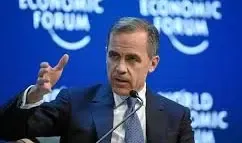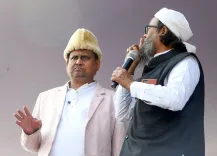Canada's Liberal Party Selects Carney to Replace Trudeau Amid Trump Tensions

Synopsis
Key Takeaways
- Mark Carney elected as new Liberal leader.
- Challenges ahead with US President Trump.
- Carney emphasizes Canadian sovereignty.
- Retaliatory tariffs under consideration.
- Trudeau steps down amid party dissent.
Ottawa, March 10 (NationPress) Canada’s Liberal Party has chosen Mark Carney, a renowned financial specialist, to lead the country through its challenges with US President Donald Trump.
Carney achieved a decisive victory on Sunday in his quest to take over from the beleaguered Prime Minister Justin Trudeau and will serve in this capacity until the elections later this year.
In a bold stance against Trump, he remarked post-election, “We didn’t ask for this fight, but Canadians are always ready when someone else drops the gloves.”
Carney has previously served as the governor of both the British and Canadian central banks, providing him with the expertise required to steer the nation through the economic turmoil initiated by Trump’s tariffs, despite being a political newcomer without prior elected positions.
“America is not Canada. And Canada never, ever, will be a part of America in any way, shape, or form,” Carney asserted.
Trump has referred to Canada as the “51st state” of the US, calling its Prime Minister a “governor” in various speeches and social media posts.
He has implemented 25 tariffs on Canadian exports to the US in an attempt to compel compliance, although some of these tariffs have been briefly suspended.
Carney stated, “The Americans want our resources, our water, our land, our country.”
Employing a sports analogy, he challenged Trump, saying, “So Americans should make no mistake: In trade, as in hockey, Canada will win.”
This comment referenced Canada’s recent victory over the US in the “4 Nations Faceoff,” an international ice hockey competition.
Carney, who advocates for retaliatory tariffs against the US, emphasized, “My government will maintain our tariffs until the Americans demonstrate respect.”
He also suggested that Canada could leverage its electricity exports to the US as a negotiating tool.
Trudeau has been at the helm of the Liberal Party for 13 years and has been Prime Minister for nearly a decade.
He agreed to step down in January due to increasing dissent within his party as his approval ratings fell, posing a risk to the Liberals in the upcoming election.
Trudeau's leadership has been marred by his confrontational approach towards India and a perceived sympathy for Khalistani movements, along with his abrasive style that has heightened tensions with Trump.
Carney, not having held elected office and prioritizing the economic crisis with the US, is less likely to seek support from Khalistani factions.
Addressing economic issues is familiar territory for Carney, who previously guided the Bank of England through the challenges of Brexit.
Former Finance Minister and Deputy Prime Minister Chrystia Freeland, who had a falling out with Trudeau after losing the finance portfolio, was Carney’s main competitor.
Carney dominated the party election with 85.9 percent of the votes.
At the time Trudeau announced his reluctant resignation, the opposition Conservative Party held a significant lead in the polls over the Liberal Party. However, this lead has narrowed amid the confrontation with Trump, and a recent CTV-Nanos poll indicated that the Liberals were trailing by just two points, with Trump being a primary concern for voters.
Carney is not currently a member of parliament, having been swiftly appointed as finance minister by Trudeau, necessitating an early call for national elections.










